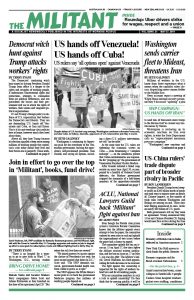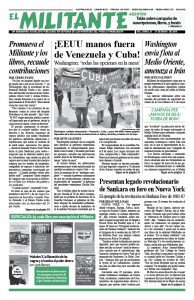NEW YORK — Mayor Bill de Blasio announced in April the city plans to slash $16 million in funding for public libraries in 2020. The cuts will mean another round of reduced hours and staffing here. This won’t only hit employees, but add to the burden on all working people, who depend more than ever on an array of programs, computer services and activities — as well as for books, music and videos — offered by the libraries.
Over the last decade, Democratic and Republican administrations alike at all levels have curtailed or eliminated public and school libraries in cities and rural counties across the country. In Chicago only one quarter of public schools have librarians. Most city libraries in Kern County, California, are open just two or three days a week. Similar conditions are more and more the norm.
Threats of more closures and further defunding loom as government officials and capitalist politicians blackmail workers with the fake choice to either accept tax hikes or face cuts and layoffs in public services.
“The capitalist rulers don’t need public libraries,” said Seth Galinsky, Socialist Workers Party candidate for New York City public advocate. “They don’t need workers to be educated. They only need us to be obedient, and, over time, to lose any desire to broaden our cultural horizons and see ourselves as actors on the stage of history.”
A conquest of the class struggle
Public libraries were a conquest of the class struggle. They were conquered as community centers and public spaces for reading, study, and formal and informal meetings. Besides books, they provide cultural and educational programs, especially in working-class communities. They offer a confidential place for free access to ideas, without fear of censure from relatives, teachers or others.
In the midst of the current economic and social crisis battering working people, and the shuttering of city employment services, public libraries and librarians have taken on crucial social functions like helping workers seek jobs, housing, and health and social services — including increasingly scarce mental health and drug addiction treatment.
Library closures in rural areas eliminate what is often the only access to free internet services. This is also true in working-class neighborhoods in cities. Students without internet go to libraries to study and use a computer. Not having a quiet place to study and read at home because families are forced to share small apartments as rents soar, makes libraries a crucial refuge.
Nearly 9,000 workers imprisoned in New York City jails — most of whom haven’t been convicted of anything — have little or no access to books or periodicals. This is common in prisons across the country. Access by prisoners to productive educational material that can break isolation, and can lead to more solidarity and revolutionary activity is a right all workers should defend.
The origin of the New York Public Library system dates back to the last quarter of the 19th century, as demand for better conditions — including rest, study and recreation — grew among workers.
Women who were entering the garment industry in throngs helped lead the way. They saw the value of reading, public lectures and other cultural activities, and had less access than men.
One group of women in a Grace Church sewing class set up free libraries and reading rooms in rented locations around the city beginning in 1879, proving it was possible. This gave impetus to the fight for free public libraries.
Eventually, as they expanded, these independent libraries merged, leading to consolidation of a single free public system in 1901.
In 1913, Vladimir Lenin, central leader of the 1917 Russian Revolution, wrote about the revolutionary implications of the New York Public Library system. He said it made “boundless libraries available, not to a guild of scholars, professors and other such specialists, but to the masses, to the crowd, to the mob!”
The fight for universal and lifetime education for all is a central demand of the working class movement.
“Learning as a lifetime experience — I cannot think of a better reason to make a socialist revolution,” says Jack Barnes, national secretary of the Socialist Workers Party, in Are They Rich Because They’re Smart? Class, Privilege, and Learning under Capitalism. “And we have the living example of the Cuban Revolution to show how it’s possible to start down that road” to get rid of capitalism, begin transforming humanity, and build human solidarity.

